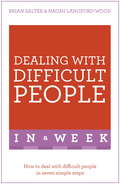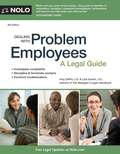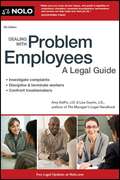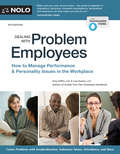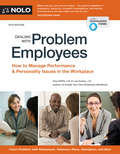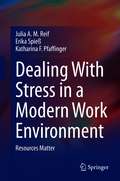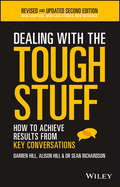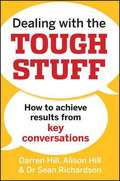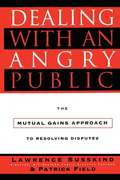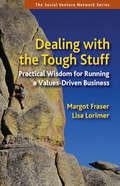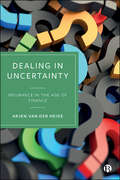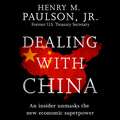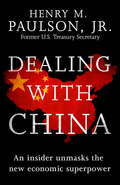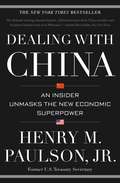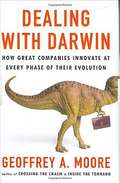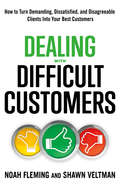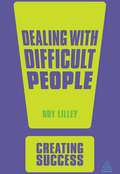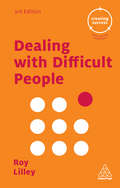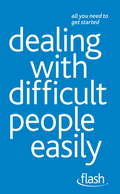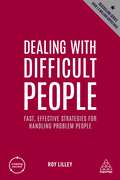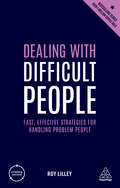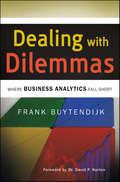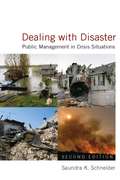- Table View
- List View
Dealing With Difficult People In A Week: How To Deal With Difficult People In Seven Simple Steps (Teach Yourself In A Week Ser.)
by Brian Salter Naomi Langford-WoodThe ability to deal with difficult people is crucial to anyone who wants to advance their career. Written by Brian Salter and Naomi Langford-Wood, leading experts on dealing with difficult people as both coaches and practitioners, this book quickly teaches you the insider secrets you need to know to in order to overcome the barriers presented by difficult colleagues or customers.The highly motivational 'in a week' structure of the book provides seven straightforward chapters explaining the key points, and at the end there are optional questions to ensure you have taken it all in. There are also cartoons and diagrams throughout, to help make this book a more enjoyable and effective learning experience.So what are you waiting for? Let this book put you on the fast track to success!
Dealing With Problem Employees
by Lisa Guerin Amy DelpoHandle workplace issues legally Are you a conscientious, well intentioned employer with a problem employee on your hands? Then this book is for you. Dealing With Problem Employees provides proven techniques and more important, immediate resolutions for how effectively manage your problem employee. Find out how to: - avoid hiring problem employees - turn problem employees into productive, valuable workers - safely and legally terminate those employees who can't or won't improve - investigate problems and complaints - conduct performance evaluations - apply progressive discipline - handle severances and references - institute effective policies and procedures This edition is completely updated to reflect the latest employment laws in your state. It also provides sample policies, forms and checklists to help you create a trouble free workplace.
Dealing With Problem Employees
by Amy Delpo AttorneyTake control of your problems and your workplace. Do you have an employee who isn't performing, isn't producing or doesn't show up at all? Or does your workplace seem to be a breeding ground for all kinds of employee problems, large and small? No matter what the problem is, this book can help. Dealing With Problem Employees provides proven techniques-- and more importantly, immediate fixes-- for dealing with the inevitable problem employee. Find out how to: avoid hiring problem employees recognize who is and isn't a problem employee help problem employees get back on track investigate problems and complaints conduct performance evaluations apply progressive discipline suspend employees fire employees handle severances and references institute effective policies and procedures The 6th edition includes the latest legal developments, including changes to the Americans with Disabilities Act and the Medical Leave Act, as well as recent Supreme Court decisions on retaliation. Information in all 50-state charts is also updated.
Dealing With Problem Employees: How to Manage Performance & Personal Issues in the Workplace
by Lisa Guerin Amy DelpoManage employee problems, legally and effectively Every workplace has occasional problems with employees. This book is packed with the legal and practical information you need to handle those problems without getting into legal trouble. It provides proven techniques—and immediate solutions. Find out how to quickly and legally: manage performance issues investigate problems and complaints help problem employees get back on track handle severances and references avoid hiring problem employees in the future This edition of Dealing With Problem Employees is completely updated to reflect the latest employment laws in every state. It provides sample policies, forms, and checklists to help you at every step.
Dealing With Problem Employees: How to Manage Performance & Personal Issues in the Workplace
by Lisa Guerin Amy DelpoManage employee problems, legally and effectively Every workplace has occasional problems with employees. This book is packed with the legal and practical information you need to handle all kinds of issues—from small corrective actions to major problems that put your company at risk. It provides proven techniques—and immediate solutions. Find out how to quickly and legally: manage performance issues investigate problems and complaints help problem employees get back on track lay the groundwork for termination handle severances and references avoid discrimination and other types of lawsuits, and avoid hiring problem employees in the future. This edition is completely updated to reflect the latest employment laws in every state. It provides sample policies, forms, and checklists to help you at every step.
Dealing With Stress in a Modern Work Environment: Resources Matter
by Erika Spieß Katharina F. Pfaffinger Julia A. ReifThis book provides an evidence-based, comprehensive and vividly illustrated overview of stress and stress management, emphasizing the central role of resources. Scientists and practitioners, students, employees and employers can use this book to bring themselves up to date on the current state of psychological stress research and learn many practical tips and tricks for dealing with stress and resources.Building on proven and contemporary psychological theories of stress and resource research, this book explains how stress emerges, how resources influence the stress process and what individuals and organizations can do to prevent stressors, reduce stress, recover from stress, and cope with the long-term consequences of strain. The book takes up current societal trends such as digitization and automation, and refers to cultural influences and differences.Through numerous case studies, facts and figures, checklists and exercises, the book not only leads the reader on an exciting journey through the scientific background and history of stress research, but also offers numerous opportunities for self-assessment and critical reflection on (one's own) work in organizations.
Dealing With The Tough Stuff
by Alison Hill Sean Richardson Darren HillA practical toolkit for handling workplace conflict and difficult conversations Dealing with the Tough Stuff is the business leader's critical guide to handling difficult conversations in the workplace. Based on the science of human behaviour -- both verbal and nonverbal -- this book is packed full of practical and pragmatic strategies for managing conflict situations. You'll learn a variety of diagnostics, models and processes that you can start using today, and you'll benefit from expert tips, tricks and tools for leading important conversations with empathy and assertiveness. This updated second edition includes new material on key conversations with distance workers, as well as within the context of a fast-growth company, and a broad selection of real-world case studies from a diverse array of workplaces. Backed by contemporary psychological theory and time-tested amongst thousands of leaders, these highly relevant suggestions give you the power to deal with the tough stuff effectively and compassionately. The human element plays a large part in the manager's role, yet many lack the training needed to deal with people effectively. This book helps you understand what makes people tick, and helps you develop the human skills you need to manage. Achieve clarity and directness in your communications Deal with anger, stubbornness and defensiveness Develop the skills to manage immediate crises Set priorities, and build a foundation of strong communication Avoiding the tough stuff can be extremely costly for managers, staff and the business as a whole. No one enjoys these conversations, but they are inevitable -- and the right set of skills goes a long way toward making them run smoothly, with greater results out the other side. Dealing with the Tough Stuff is your indispensable primer on human behaviour, and effectively navigating tough conversations at work.
Dealing With The Tough Stuff: How To Achieve Results From Crucial Conversations
by Alison Hill DarrenHow to handle difficult discussions in the workplace Packed with practical and pragmatic suggestions and methods for dealing with the tough stuff at work, this unique and helpful book features simple diagnostics, models, and processes that you can put to use immediately. The author team shares their years of research and experience so that you can benefit from their case studies and examples, all of which are aimed at increasing the confidence of anyone working in a management or leadership role. You'll discover how the science of human behavior--both verbal and nonverbal--plays an enormous role when handling conflict situations and you'll learn how to apply a variety of tools, tips, and strategies when leading critical conversations with empathy and assertiveness. Explains why avoiding dealing with the tough stuff at work can be so costly for managers, staff, and, ultimately, the business Features methods and strategies that have been backed by contemporary theory and tested and trialed with thousands of participants Zeroes in on ways to uncover the root cause of difficult behavior Shares advice for finding the best way to be assertive in any situation Reveals techniques for depersonalizing conflict and avoiding language that causes conflict
Dealing With an Angry Public: The Mutual Gains Approach to Resolving Disputes
by Lawrence Susskind Patrick FieldIn this practical book, Lawrence Susskind and Patrick Field analyze scores of both private and public-sector cases, as well as crisis scenarios such as the Alaskan oil spill, the silicone breast implant controversy, and nuclear plant malfunction at Three Mile Island. Susskind and Field outline the six key elements of mutual gains approach in order to help business and government leaders negotiate, rather than fight, with their critics. In the process, they show how to identify who the public is, whose concerns to address first, which people and organizations must be convinced of the legitimacy of action taken, and how to assess and respond to different types of anger effectively.
Dealing With the Tough Stuff: Practical Wisdom for Running a Values-Driven Business
by Lisa Lorimer Margot FraserYour business plan is only going to get you so far. When you’re actually running a values-driven business problems come up that you never could have anticipated. And as a mission-driven organization you face issues your more conventional colleagues never have to grapple with. The whole experience can be incredibly isolating and draining. Margot Fraser and Lisa Lorimer have been there, and they’re here to help. Together with five of their colleagues—including Stonyfield Yogurt founder Gary Hirshberg and former Ms. Foundation president Marie C. Wilson—they offer the kinds of personal insights and seasoned advice you just can’t get in business school. It’s like having a coaching session with some of the nation’s top socially conscious entrepreneurs. Each chapter of Dealing with the Tough Stuff tackles a particular challenge. How open and honest can you really be with your employees and still run an efficient business? At what point do you seek outside expertise? What do you do when things go terribly wrong? When is it time to leave? The authors and the members of their “advisory board” share their experiences—not just what worked, but sometimes what spectacularly didn’t. Some of these stories are harrowing: a worker getting killed by factory equipment, a supplier embezzling funds, a false accusation of intellectual property theft. Others are simply day-to-day conundrums: meeting payroll when you’re always in debt, deciding when and how to expand in a responsible way, balancing business needs with your commitment to the triple bottom line. At the end of each chapter, Lorimer and Frasier draw on the stories to offer practical "survival suggestions" that can guide readers through similar situations. This is a book that readers can look to for affirmation, hope and tools. Others have been through what you’re going through, if not worse. They made it and so can you—because they’re going to show you how they did it. No book can cover every challenge that might arise, but if you learn from the attitudes, techniques and coping mechanisms these seasoned leaders offer, you’ll get through the tough stuff with your sanity and your business intact.
Dealing in Uncertainty: Insurance in the Age of Finance
by Arjen van der HeideInsurance is an important – if still poorly understood – mechanism for dealing with a broad variety of risks associated with modern life. This book conducts an in-depth examination of one of the largest and longest-established private insurance industries in Europe: British life insurance. In doing so, it draws on over 40 oral history interviews to trace how the sector has changed since the 1970s, a period characterized by rampant financialization and neoliberalization. Combining insights from science and technology studies and economic sociology, this is an unprecedented study of the evolution of insurance practices and an invaluable contribution to our understanding of financial capitalism.
Dealing with China
by Hank PaulsonDEALING WITH CHINA takes the reader behind closed doors to witness the creation and evolution and future of China's state-controlled capitalism.Hank Paulson has dealt with China unlike any other foreigner. As head of Goldman Sachs, Paulson had a pivotal role in opening up China to private enterprise. Then, as Treasury secretary, he created the Strategic Economic Dialogue with what is now the world's second-largest economy. While negotiating with China on needed economic reforms, he safeguarded the teetering U.S. financial system. Over his career, Paulson has worked with scores of top Chinese leaders, including Xi Jinping, China's most powerful man in decades. In DEALING WITH CHINA, Paulson draws on his unprecedented access to modern China's political and business elite, including its three most recent heads of state, to answer several key questions:How did China become an economic superpower so quickly?How does business really get done there?What are the best ways for Western business and political leaders to work with, compete with, and benefit from China?How can the West negotiate with and influence China given its authoritarian rule, its massive environmental concerns, and its huge population's unrelenting demands for economic growth and security?Written in an anecdote-rich, page-turning style, DEALING WITH CHINA is certain to become the classic and definitive examination of unlocking, building, and engaging an economic superpower.
Dealing with China: An Insider Unmasks The New Economic Superpower
by Hank PaulsonDEALING WITH CHINA takes the reader behind closed doors to witness the creation and evolution and future of China's state-controlled capitalism.Hank Paulson has dealt with China unlike any other foreigner. As head of Goldman Sachs, Paulson had a pivotal role in opening up China to private enterprise. Then, as Treasury secretary, he created the Strategic Economic Dialogue with what is now the world's second-largest economy. While negotiating with China on needed economic reforms, he safeguarded the teetering U.S. financial system. Over his career, Paulson has worked with scores of top Chinese leaders, including Xi Jinping, China's most powerful man in decades. In DEALING WITH CHINA, Paulson draws on his unprecedented access to modern China's political and business elite, including its three most recent heads of state, to answer several key questions:How did China become an economic superpower so quickly?How does business really get done there?What are the best ways for Western business and political leaders to work with, compete with, and benefit from China?How can the West negotiate with and influence China given its authoritarian rule, its massive environmental concerns, and its huge population's unrelenting demands for economic growth and security?Written in an anecdote-rich, page-turning style, DEALING WITH CHINA is certain to become the classic and definitive examination of unlocking, building, and engaging an economic superpower.
Dealing with China: An Insider Unmasks the New Economic Superpower
by Henry M. PaulsonNEW YORK TIMES BESTSELLERDEALING WITH CHINA takes the reader behind closed doors to witness the creation and evolution and future of China's state-controlled capitalism. Hank Paulson has dealt with China unlike any other foreigner. As head of Goldman Sachs, Paulson had a pivotal role in opening up China to private enterprise. Then, as Treasury secretary, he created the Strategic Economic Dialogue with what is now the world's second-largest economy. He negotiated with China on needed economic reforms, while safeguarding the teetering U.S. financial system. Over his career, Paulson has worked with scores of top Chinese leaders, including Xi Jinping, China's most powerful man in decades. In DEALING WITH CHINA, Paulson draws on his unprecedented access to modern China's political and business elite, including its three most recent heads of state, to answer several key questions:How did China become an economic superpower so quickly?How does business really get done there?What are the best ways for Western business and political leaders to work with, compete with, and benefit from China?How can the U.S. negotiate with and influence China given its authoritarian rule, its massive environmental concerns, and its huge population's unrelenting demands for economic growth and security?Written in the same anecdote-rich, page-turning style as Paulson's bestselling memoir, On the Brink, DEALING WITH CHINA is certain to become the classic and definitive examination of how to engage China's leaders as they build their economic superpower.
Dealing with Crises: Don't Wait Until They Hit
by Richard LueckeCrises affect all businesses sooner or later. Some are preventable. Others can be anticipated. But no matter what their origins, the things managers do and the decisions they make can make the situation a lot worse--or better. This chapter offers practical ideas for preventing crises, anticipating them, and managing them when they occur.
Dealing with Darwin
by Geoffrey MooreThe Darwinian struggle of business keeps getting more brutal as competitive advantage gaps get narrower and narrower. Anything you invent today will soon be copied by someone else--probably better and cheaper. Many companies thrive during the early stages of their life cycle, only to fall slack during periods of inertia and die out while others surge ahead. But as Geoffrey Moore shows, some notable companies have figured out how to deal with Darwin in their mature years--making changes on the fly while fending off challenges from every quarter.
Dealing with Difficult Customers: How to Turn Demanding, Dissatisfied, and Disagreeable Clients Into Your Best Customers
by Noah Fleming Shawn VeltmanIgnore a valid complaint and you could be the next viral sensation for all the wrong reasons. But give in to every demand and you may be consumed with the often petty complaints of your worst customers and wind up pandering to them with freebies, discounts, and special attention. That will cost you time and money, and perhaps worse, do little or nothing to solve the root problem.Dealing with Difficult Customers will show you:How to stop using gimmicks and trick promotions to encourage repeat business and the alternatives that will keep your customers salivating for more.How &“Hungry Hippos&” and &“Problem Children&” are sapping your employees time and energy and what to do about them.The behaviors that turn great customers into dissatisfied critics and how to change them.
Dealing with Difficult People
by Roy LilleyMoaners, fault finders, manipulators - these are just a few examples of the difficult people we put up with at work. However by understanding their motives and individual behaviours you can learn to manage aggression, avoid awkward situations and keep your cool. This second edition of the best-selling Dealing with Difficult People includes a brand new chapter on dealing with difficult people in the digital sphere. It provides the tools and techniques you need to get the best out of the worst, including how to deal with difficult customers, advice on beating bullies at their own game and how to deal with a boss who drives you barmy.
Dealing with Difficult People
by Roy LilleyDealing with Difficult People will help you navigate the bullies, nit-pickers, manipulators and complainers who drive you mad at work. With example dialogue, techniques and tips, it will help you avoid horrible situations and keep your cool.By understanding the motives and individual behaviours of difficult people, you can learn to manage aggression, reduce awkwardness and remain the better person. This third edition of the best-selling Dealing with Difficult People provides the tools and techniques you need to get the best out of the worst, including how to deal with difficult customers, dealing with difficult people in the digital sphere, advice on beating bullies at their own game and how to deal with a boss who drives you barmy.The creating success series of books...With over one million copies sold, the hugely popular Creating Success series covers a wide variety of topics and is written by an expert team of internationally best-selling authors and business experts. This indispensable business skills collection is packed with new features, practical content and inspiring guidance for readers across all stages of their careers.
Dealing with Difficult People Easily: Flash
by Karen ManneringThe books in this bite-sized new series contain no complicated techniques or tricky materials, making them ideal for the busy, the time-pressured or the merely curious. In just 96 pages, Dealing with Difficult People Easliy shows you how to deal with an unpleasant but unavoidable aspect of working life that can have a major impact on your career and wellbeing, including knowing how to define and deal with a difficult person in any work relationship and how to understand yourself and deal with difficult aspects of your own personality.
Dealing with Difficult People Easily: Flash
by Karen ManneringThe books in this bite-sized new series contain no complicated techniques or tricky materials, making them ideal for the busy, the time-pressured or the merely curious. In just 96 pages, Dealing with Difficult People Easliy shows you how to deal with an unpleasant but unavoidable aspect of working life that can have a major impact on your career and wellbeing, including knowing how to define and deal with a difficult person in any work relationship and how to understand yourself and deal with difficult aspects of your own personality.
Dealing with Difficult People: Fast, Effective Strategies for Handling Problem People (Creating Success #3)
by Roy LilleyLearn how to navigate the bullies, manipulators and complainers who drive you mad. With example dialogue and techniques, it will help you navigate tricky situations situations and keep your cool.By understanding the motives and individual behaviours of difficult people, you can learn to manage aggression, reduce awkwardness and remain the better person. This 5th edition of the bestselling Dealing with Difficult People features practical exercises, useful templates and top tips you need to get the best out of the worst, including how to deal with difficult customers, dealing with difficult people in the digital sphere, advice on beating bullies at their own game and how to deal with a boss who drives you barmy.The Creating Success series of books...Unlock vital skills, power up your performance and get ahead with the bestselling Creating Success series. Written by experts for new and aspiring managers and leaders, this million-selling collection of accessible and empowering guides will get you up to speed in no time. Packed with clever thinking, smart advice and the kind of winning techniques that really get results, you'll make fast progress, quickly reach your goals and create lasting success in your career.
Dealing with Difficult People: Fast, Effective Strategies for Handling Problem People (Creating Success)
by Roy LilleyDealing with Difficult People will help you navigate the bullies, nit-pickers, manipulators and complainers who drive you mad at work. With example dialogue, techniques and tips, it will help you avoid horrible situations and keep your cool.By understanding the motives and individual behaviours of difficult people, you can learn to manage aggression, reduce awkwardness and remain the better person. Updated for 2019, this 4th edition of the best-selling Dealing with Difficult People features practical exercises, useful templates, and top tips you need to get the best out of the worst, including how to deal with difficult customers, dealing with difficult people in the digital sphere, advice on beating bullies at their own game and how to deal with a boss who drives you barmy.The Creating Success series of books...Unlock vital skills, power up your performance and get ahead with the bestselling Creating Success series. Written by experts for new and aspiring managers and leaders, this million-selling collection of accessible and empowering guides will get you up to speed in no time. Packed with clever thinking, smart advice and the kind of winning techniques that really get results, you'll make fast progress, quickly reach your goals and create lasting success in your career.
Dealing with Dilemmas
by Frank BuytendijkObserving how business management is obsessed with analysis and numbers, Dealing with Dilemmas shows there is an entire class of problems that cannot be solved by analysis: business dilemmas. Dilemmas, representing a large part of strategic decision-making, require the opposite approach of analysis; synthesis. Dealing with Dilemmas shows how popular performance management methodologies can be used in new and previously unexplored ways. It authoritatively shows you how your business can move forward strategically in ways previously impossible. Shows dangers in current thinking around analytics and performance management Includes practical case examples and interviews with C-level executives and government officials world-wide, both in commercial enterprise and public sector Makes the most nebulous of management processes, strategy formulation, insightful and links it tightly to strategy execution and performance management. Filled with case studies and examples, this book reveals how your business can start solving dilemmas and move forward strategically.
Dealing with Disaster: Public Management in Crisis Situations
by Saundra K. SchneiderNow updated with examples through 2010, this classic study examines the disruptive effects of disasters on patterns of human behavior and the operations of government, and the conditions under which even relatively minor crises can lead to system breakdown.
